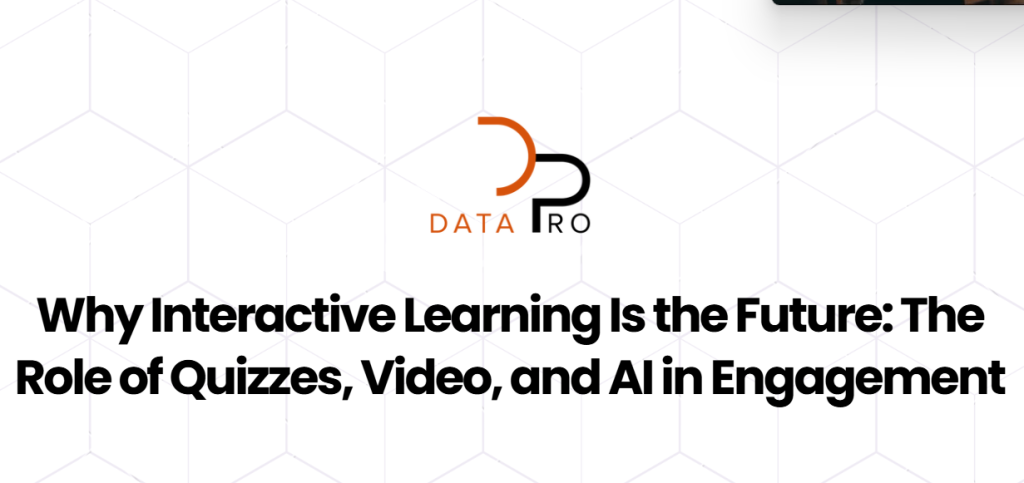
Why Interactive Learning Is the Future: The Role of Quizzes, Video, and AI in Engagement
The traditional education model is evolving rapidly, challenged by the digital transformation that has reshaped nearly every industry. Today, learners expect more than passive content consumption. They crave immersive experiences, personalized learning paths, and real-time feedback. As a result, interactive learning has emerged as a powerful alternative to static lectures and reading assignments. At the heart of this shift are three major tools: quizzes, video, and artificial intelligence (AI).
These tools are not merely supplements to existing education, they are redefining how we engage learners, enhance retention, and foster long-term comprehension.
The Limitations of Passive Learning
For decades, learning was a one-way street. Teachers delivered information, students absorbed it, and assessments came only after the fact. This passive approach has long been criticized for its inability to engage students effectively or accommodate different learning styles. Studies show that learners retain only about 10% of information when learning passively, compared to as much as 90% when they actively engage with the material.
Furthermore, traditional methods often fail to provide immediate feedback, making it difficult for students to track their progress or correct misunderstandings in real time. As digital natives increasingly populate classrooms and corporate training environments, the demand for dynamic, engaging, and interactive content is reaching new heights.
What Is Interactive Learning?
Interactive learning refers to any educational process that actively involves the learner in their own journey. This can include multimedia content, real-time assessments, simulations, games, collaborative projects, and more. The goal is to turn learning from a passive activity into an engaging, participatory experience that stimulates multiple senses and cognitive functions.
At its core, interactive learning is about feedback loops. Learners are constantly interacting with the content, getting instant responses to their actions, and adjusting their behavior accordingly. This results in higher motivation, better retention, and more effective skill development.
The Power of Quizzes: Immediate Feedback and Active Recall
Quizzes are among the simplest yet most effective tools in interactive learning. Unlike traditional testing, which often comes at the end of a module, quizzes can be integrated throughout the learning journey. This technique, known as formative assessment, enables learners to gauge their understanding in real time and adjust their study strategies accordingly.
Moreover, quizzes support a learning principle known as “active recall.” This cognitive process involves retrieving information from memory, which has been shown to strengthen neural connections and improve long-term retention.
Incorporating quizzes into digital learning platforms also allows for adaptive learning. Based on a learner’s performance, the system can dynamically adjust the difficulty level, suggest additional resources, or even personalize the content path.
Video as a Medium for Engagement and Retention
Video is now one of the most widely used tools in digital education and for good reason. It combines visual, auditory, and sometimes kinesthetic elements, appealing to a broad range of learning styles. High-quality educational videos can convey complex concepts in an accessible and entertaining way.
But the real power of video lies in its interactivity. Interactive videos, where learners can click on different elements, answer embedded questions, or make choices that affect the narrative, can increase engagement rates and learning outcomes.
Platforms like Edpuzzle, H5P, and PlayPosit allow educators to embed quizzes and prompts directly into videos, turning passive watching into an active learning experience. Studies show that learners are more likely to complete interactive videos compared to traditional ones and are better able to recall key information.
How AI Supercharges Personalization and Engagement
Artificial intelligence is the backbone of the next generation of interactive learning. By analyzing vast amounts of learner data, AI can personalize content delivery, predict performance, and recommend targeted interventions.
AI-driven platforms can identify patterns in a student’s behavior and adjust their learning journey accordingly. For instance, if a learner consistently struggles with a particular concept, the system might offer remedial content, switch to a different instructional format, or provide targeted practice problems.
Furthermore, AI chatbots and virtual tutors can provide real-time assistance, simulate human interaction, and keep learners motivated. Natural language processing (NLP) enables these systems to understand and respond to open-ended questions, creating a more conversational and intuitive learning experience.
AI also enhances the back-end of learning systems. Educators gain insights into which content is most effective, how long students engage with specific materials, and where learners are dropping off. This data-driven feedback loop enables continuous improvement of learning resources.
The Convergence of Quizzes, Video, and AI
The most powerful learning experiences often occur at the intersection of multiple interactive tools. Imagine an online course where students watch a video with embedded quizzes. Based on their answers, an AI system adjusts the upcoming content to better suit their comprehension level. A chatbot checks in periodically, offering tips, answering questions, and even providing motivational nudges.
This integrated approach ensures that learners are not only consuming content but actively engaging with it, reflecting on their understanding, and receiving support tailored to their needs.
Interactive learning ecosystems like Coursera, Khan Academy, and Duolingo are already employing this model with great success. These platforms combine video, quizzes, and AI to create a seamless, personalized learning journey that scales across millions of users.
Why Engagement Matters More Than Ever
In an age of endless digital distractions, keeping learners engaged is one of the biggest challenges in education. Interactivity addresses this head-on by making learning more rewarding, less monotonous, and better aligned with how the brain actually works.
Engaged learners are more likely to complete courses, retain information, and apply their knowledge in real-world settings. For organizations, this translates into better training outcomes, improved employee performance, and higher ROI on learning investments.
The Future of Education Is Interactive
As we look to the future, the trajectory is clear. Education is moving away from rigid, one-size-fits-all models toward flexible, interactive, and learner-centric ecosystems. The combination of quizzes, video, and AI is not just a trend, it’s a fundamental shift in how knowledge is delivered and consumed.
Educators, instructional designers, and edtech companies must embrace this evolution to remain relevant. Those that do will not only enhance learning outcomes but also foster a culture of curiosity, adaptability, and lifelong learning.
Final Thoughts
The digital revolution has redefined what it means to learn. In this new landscape, interactivity is not optional, it is essential. Quizzes stimulate the mind, video captures attention, and AI delivers personalized support at scale.
Together, these tools are building the future of education: one that is engaging, effective, and equitable. The sooner we embrace interactive learning, the sooner we can unlock the full potential of every learner, everywhere.
Innovate With Custom AI Solution
- 12 Courtyard Pl,
Lexington, MA 02420 - (617)319-0174
- corp@dataprocorp.tech
